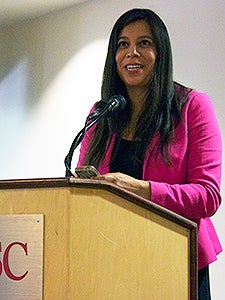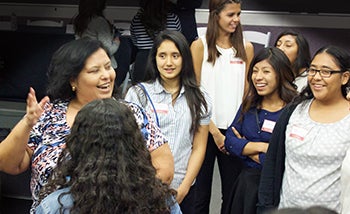
Women as Leaders
If current poll results are any indication, Hillary Clinton is likely to become the first woman president of the United States. This despite a dearth of women politicians — they represent less than 20 percent of Congress. And just six women currently serve as state governors.
Seeing the value in increasing women’s participation in national leadership, the Jesse M. Unruh Institute of Politics at USC Dornsife and USC’s Women’s Student Assembly recently presented the annual Young Women’s Political and Civic Leadership Conference.
Hosting 80 young women from Los Angeles-area high schools, the Oct. 31 event was designed to give these ambitious students an insider’s view of government and encourage them to pursue careers in a field much in need of their efforts and perspective.
“Our job at the Unruh Institute is to prepare young people to take on the challenges of leadership,” said Dan Schnur, director of the Unruh Institute. “We can help these amazing young women understand that they can aspire to be Senators, governors and Presidents.”
“But the most important part of this conference are the USC students and alumnae who act as role models for these high school girls,” he added. “Our students set an example that shows a teenager that they can make their communities a better place to live.”
Leading by example
As part of the conference, California State Assemblywoman Ling-Ling Chang and Los Angeles Unified School District Board Member Mónica García spoke on the need for women in public affairs. The elected officials emphasized the importance of overcoming barriers women typically face when running for and holding public office.

Former California State Assemblywoman Cindy Montanez provides the keynote address.
Several young political professionals, including several alumni who held office in USC student government, also gave their perspectives on how to establish a career path in politics and public service. They discussed obstacles that young women may face early in their careers and how to overcome them.
Stephanie Martinez, a senior at Alliance Susan and Eric Smidt Technology High School in Los Angeles, was particularly impressed by panelist Melissa Gibbs, who works at social impact agency Propper Daley. Gibbs, who earned a B.A. in Public Relations in 2010 and an M.C.M. in 2011 from USC, is also an advance associate at The White House and was program director at the American Foundation for Equal Rights.
“Melissa described how a male coworker told her that she had to change, insinuating that she had to act ‘less like a woman,’” Martinez said. Gibbs initially accepted the criticism and tried to “change who she was, but then she realized that she didn’t have to act less like a woman. As a woman, she has a lot to offer that guys can’t.”
When Gibbs recounted the story and explained how she handled the situation, Martinez, who hopes to major in political science and minor in Spanish at Boston College, was reminded of herself. “At times I try to please people, so I end up changing,” she said. “When [Melissa] spoke about this, she inspired me to embrace who I am as an individual instead.”
Students become the teachers
Following a keynote address by former California State Assemblywoman Cindy Montañez and a workshop aimed at teaching participants how to network, several high school seniors who attended previous conferences spoke. The conference alumni shared how they have used what they learned to start initiatives at their schools and strived to inspire this year’s attendees to break new ground in public service.

High school seniors Stephanie Martinez, right, and Alejandra Lopez, center rear, gained valuable career advice from Los Angeles Unified School District Board Member Monica Garcia, left.
“I think it is very important to spread the word about women’s empowerment,” said Alejandra Lopez, a senior at Warren High School in Downey, Calif., who first attended a conference in April. “I am concerned with the representation of women in congress. Women are a part of society and our voice matters. Women need to be heard and understood just as much as men.”
Lopez, who said she wants to major in political science (“preferably at USC!”) as a step toward running for a U.S. Senate seat one day, hoped to motivate this year’s students as much as she was inspired when she attended.
“I wanted to get the girls motivated this year and show them that anything can be done. Get the opportunity and take it, no matter how big or small it is.”
At least one attendee seems to have receive the message loud and clear.
“I am concerned with education disparity among low-income schools,” said Martinez, who plans to start a nonprofit aimed at addressing the issue. “When I went to summer school, my friends in low-income areas near my school would talk about programs offered at their school, and I had no idea those programs existed. How are students supposed to succeed if they aren’t informed about these options?”
Armed with what she’s learned at the Young Women’s Political and Civic Leadership, Martinez hopes to answer that question one day soon.
“This is a difficult goal, but the conference was the first step.”